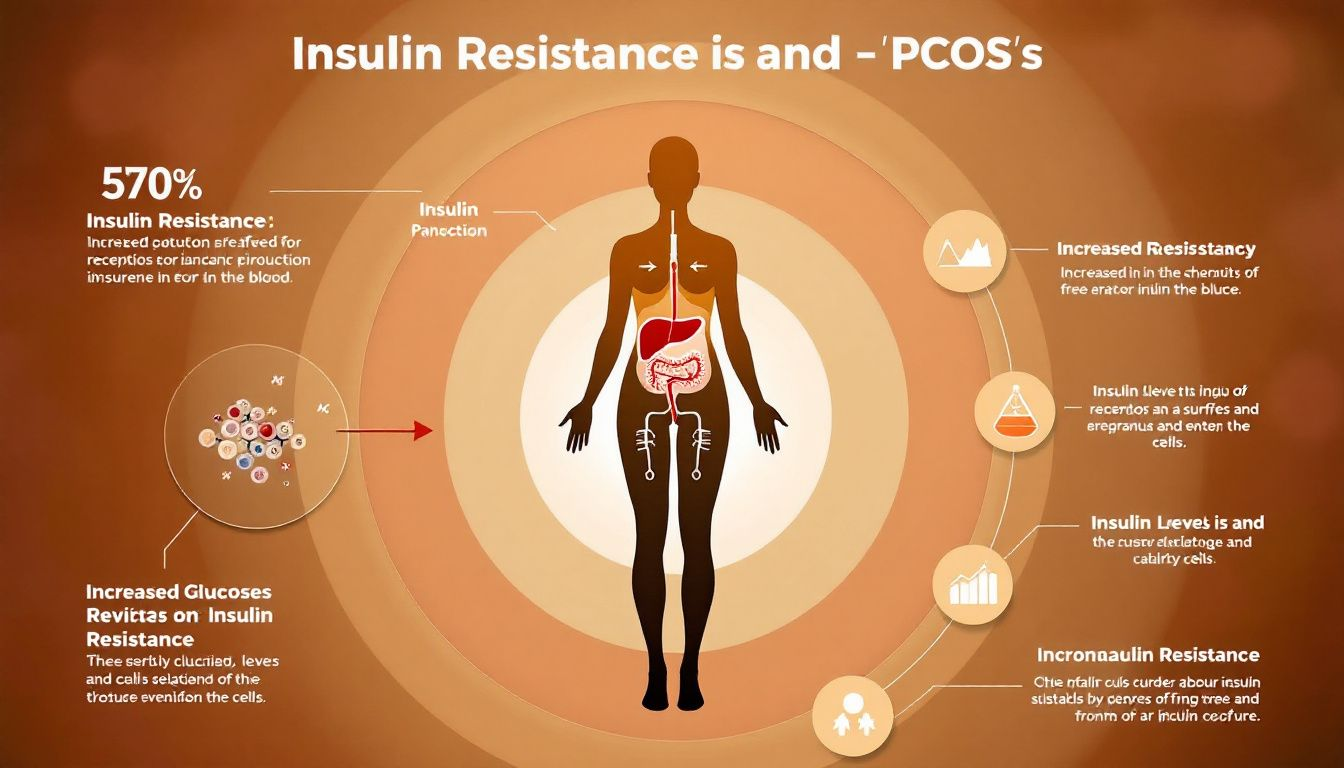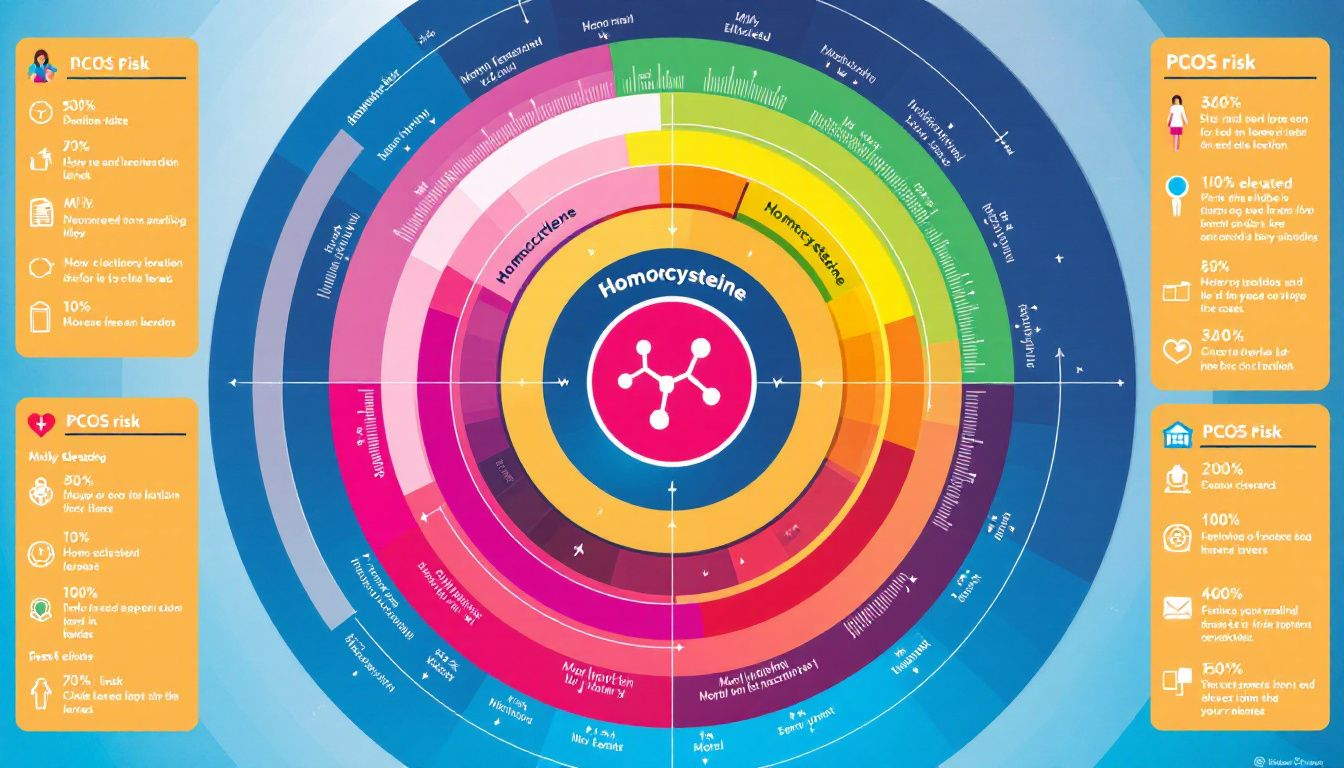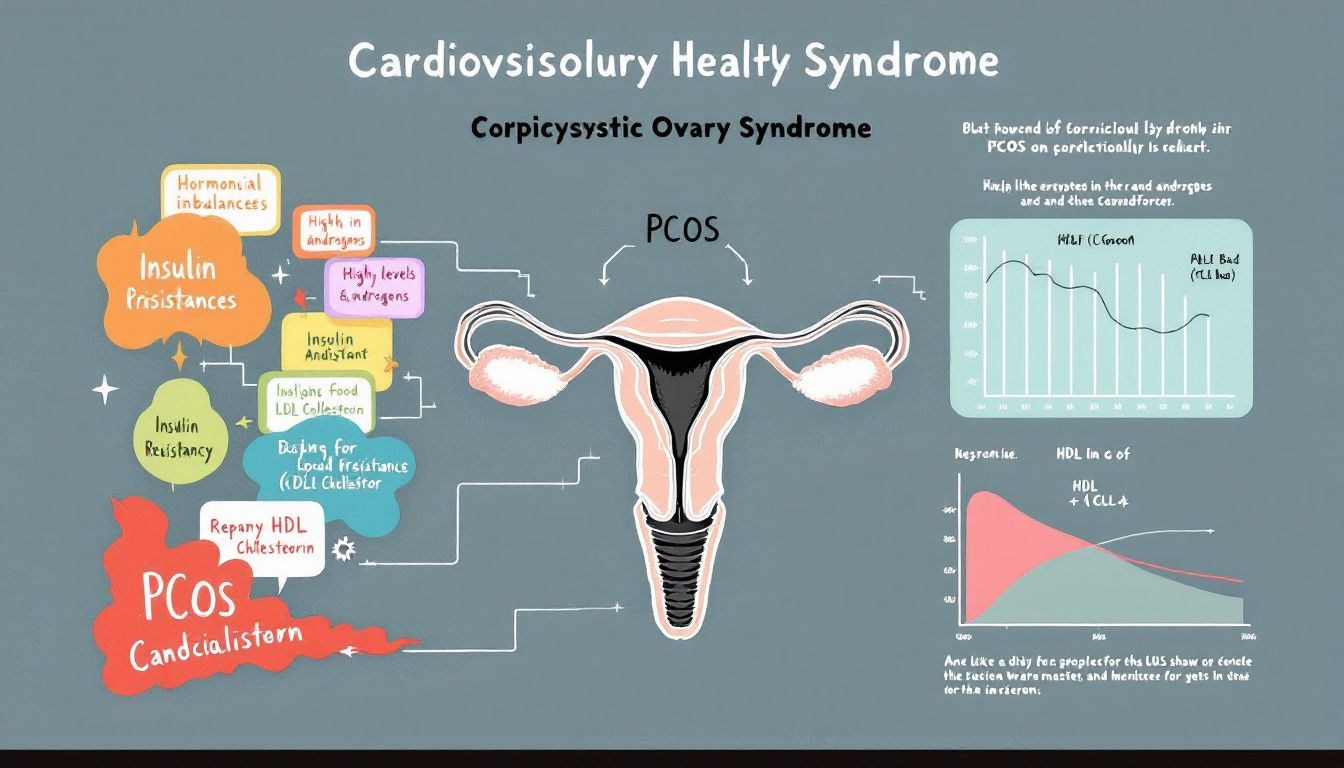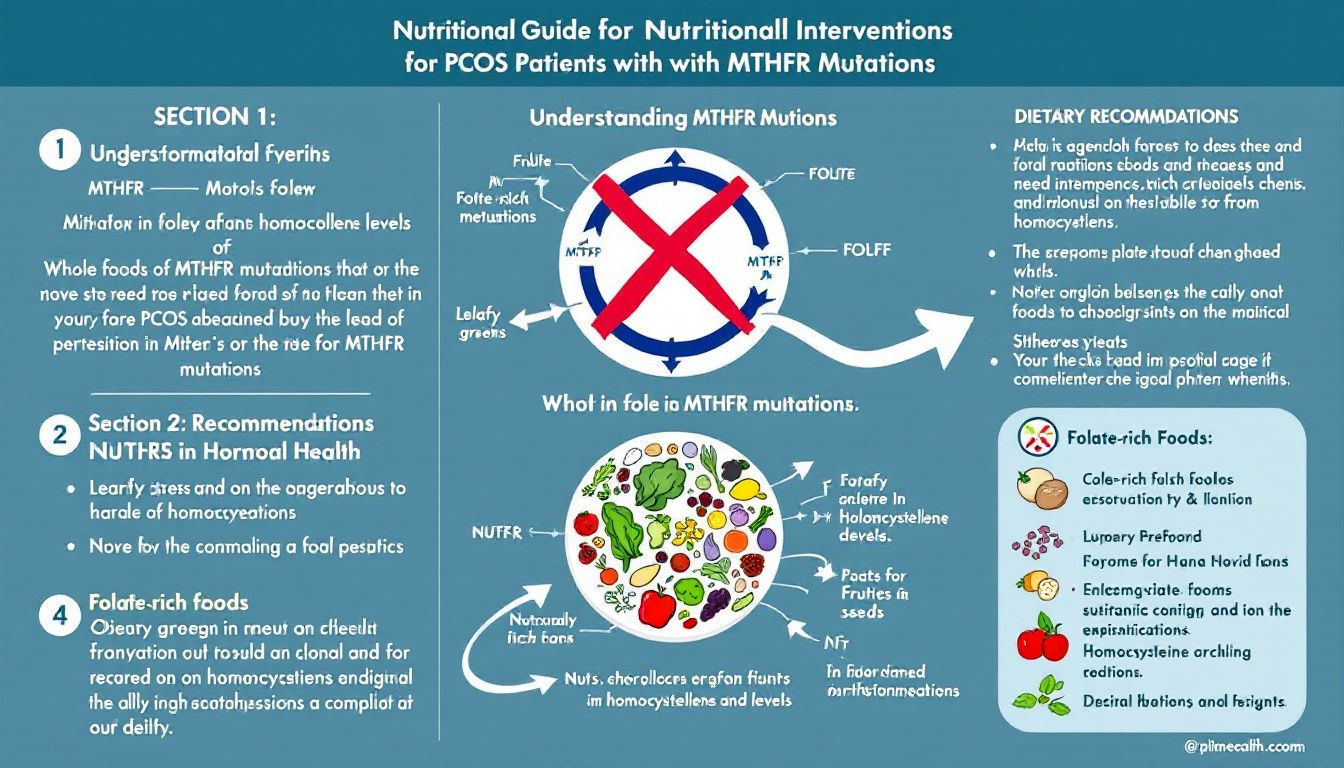How do MTHFR gene mutations affect women with PCOS MTHFR? This article explores the connection between PCOS and MTHFR, highlighting the impact on fertility and overall health risks. You’ll learn about the role of the MTHFR gene in folate metabolism, how its mutations may worsen PCOS symptoms, and strategies for managing these risks.
Key Takeaways
PCOS, affecting 12-18% of women, is linked to MTHFR gene mutations that impair folate metabolism, increasing health risks and complications.
MTHFR mutations elevate homocysteine levels, contributing to insulin resistance, cardiovascular issues, and adverse pregnancy outcomes in women with PCOS.
Early diagnosis and genetic testing for MTHFR can inform personalized treatment plans, and nutritional interventions are essential for managing health risks associated with PCOS.
- Gene mutations in CYP, MTHFR are key to solving PCOS problems.
Understanding PCOS and MTHFR

Polycystic Ovary Syndrome (PCOS) is a prevalent disorder. It impacts the endocrine and metabolic health of women who are of childbearing age. Marked by ovarian cysts and often associated with endocrine toxicity, PCOS can greatly affect a woman’s reproductive and overall health. Affecting between 12% and 18% of women, PCOS is a significant area of study and concern.
The MTHFR gene plays a vital role in folate metabolism, which is essential for DNA methylation and RNA synthesis. Variants of the mthfr genes, such as C677T and A1298C, can significantly impair these processes, leading to elevated homocysteine levels and various health complications. These mutations can compromise folate metabolism, exacerbating the symptoms and risks associated with PCOS.
For women with PCOS, the interplay between MTHFR mutations and their condition is particularly significant. MTHFR mutations can affect hormone regulation and metabolic processes, leading to a higher susceptibility to PCOS and its complications. Recognizing this connection is key to creating effective management strategies for women with PCOS.
Genetic Factors in PCOS
Genetic factors play a pivotal role in the development and progression of polycystic ovary syndrome (PCOS). Among these, the MTHFR gene stands out due to its significant influence on homocysteine levels and metabolic processes. Single nucleotide polymorphisms (SNPs) in the MTHFR gene can alter its function, affecting the severity and symptoms of PCOS. For example, the C677T polymorphism is associated with varying PCOS risks across different ethnic groups, highlighting the influence of genetic diversity on this condition.
Another critical mutation is the MTRR A66G, which, like MTHFR variants, is associated with serum homocysteine levels and potentially influences PCOS risk. These genetic mutations contribute to metabolic complications and a broader range of endocrine dysfunctions in PCOS patients. The role of the MTHFR gene in folate metabolism and DNA synthesis further underscores its importance in understanding PCOS susceptibility.
Women with polycystic ovary syndrome often face a complex interplay of genetic factors that increase their risk and complicate their condition. Pinpointing these factors can lead to more effective treatments and interventions, potentially easing the burden of PCOS on women’s health.
MTHFR Mutations and Insulin Resistance in PCOS

One of the more insidious aspects of polycystic ovary syndrome (PCOS) is its association with insulin resistance. Women with problematic MTHFR gene variants are more likely to experience this metabolic syndrome challenge. For instance, the frequency of the severe MTHFR 677C>T genotype is significantly higher in PCOS women who suffer from insulin resistance (19%) compared to those without it (6%). This stark difference highlights the critical role of MTHFR mutations in exacerbating insulin resistance among PCOS patients.
Studies indicate that elevated homocysteine levels, often due to MTHFR mutations, can exacerbate insulin resistance and inflammation in PCOS patients. This relationship underscores the importance of managing homocysteine levels to mitigate some of the metabolic challenges faced by women with PCOS. Additionally, the MTHFR A1298C mutation mediates PCOS risk through elevated serum homocysteine levels, further linking genetic mutations to metabolic dysfunctions.
The reduction in methyl groups due to MTHFR mutations can adversely affect hormone regulation, leading to a cascade of metabolic issues. Recognizing these genetic influences is key to developing targeted interventions for managing insulin resistance and enhancing metabolic health in women with PCOS.
Homocysteine Levels and PCOS Risk

The link between homocysteine levels and polycystic ovary syndrome (PCOS) is a significant research focus. The MTHFR gene is essential for the methylation process, which influences DNA activity and overall health. Women with PCOS often experience elevated homocysteine levels due to MTHFR gene mutations, particularly the A1298C variant. This increase in homocysteine is not just a biochemical anomaly; it plays a significant role in the pathogenesis of PCOS and impacts metabolic health.
Higher levels of homocysteine in the blood are associated with an increased risk of miscarriage in women with PCOS. This association highlights the broader implications of elevated plasma homocysteine levels, which can affect reproductive outcomes and overall health risks for women with PCOS. Therefore, controlling these levels is vital to reducing PCOS risk and its complications.
Recognizing the role of homocysteine in PCOS helps healthcare providers devise more effective management strategies. By targeting homocysteine levels through nutritional and medical interventions, it may be possible to reduce the severity and impact of PCOS on women’s health.
Impact on Cardiovascular Health

Impaired methylation due to MTHFR mutations can greatly affect cardiovascular health. This impairment can lead to inflammation and clotting issues, both of which are critical factors in the development of cardiovascular disease. The accumulation of cellular byproducts due to impaired methylation contributes to cellular dysfunction, increasing the risk of cardiovascular complications. For women with PCOS, these risks are particularly pronounced due to the additional metabolic challenges they face.
Elevated homocysteine levels, commonly linked to MTHFR mutations, are a known risk factor for cardiovascular issues in women with PCOS. These elevated levels can lead to dysfunction in the blood vessel lining, further increasing the likelihood of cardiovascular problems. Regular homocysteine level screenings can identify women at higher risk, allowing for timely interventions to reduce health risks.
Women with PCOS and MTHFR mutations may benefit from regular homocysteine level monitoring as part of their preventive healthcare. By staying vigilant and proactive about cardiovascular health, it is possible to reduce the long-term risks associated with these genetic and metabolic challenges.
Adverse Pregnancy Outcomes
Women with PCOS and MTHFR mutations often face a challenging journey to motherhood. MTHFR mutations are associated with higher risks of miscarriage and other adverse pregnancy outcomes. These genetic variations can reduce egg quality due to increased inflammation and coagulation issues. This combination can make it more challenging for women with PCOS to conceive and maintain a healthy pregnancy.
High homocysteine levels and inflammation are linked to an increased risk of miscarriage and ovulatory dysfunction in women with PCOS. These factors contribute to the overall fertility challenges faced by this group. Elevated homocysteine levels, in particular, have been associated with increased risks of pregnancy complications, underscoring the importance of managing these levels for better reproductive outcomes.
The combined effects of MTHFR mutations, elevated homocysteine, and inflammation create substantial fertility challenges for women with PCOS. Addressing these genetic and metabolic issues through targeted interventions can improve pregnancy outcomes and help women with PCOS achieve their dream of motherhood.
Diagnostic Criteria and Genetic Testing
Diagnosing PCOS requires a thorough evaluation of symptoms and ruling out other endocrine disorders. The Rotterdam consensus defines PCOS using at least two of three criteria: clinical hyperandrogenism, oligo-anovulation, and polycystic ovaries. The diagnostic criteria established by the NIH in 1990 emphasize the exclusion of other endocrine disorders, ensuring a more accurate diagnosis.
Genetic testing for MTHFR mutations helps in understanding the potential risks associated with PCOS. Early identification of these genetic factors offers valuable insights into the severity and management of PCOS. Genetic evaluation, including testing for SNPs like the C677T and A1298C variants, can inform personalized treatment plans and preventive strategies.
Early diagnosis and comprehensive genetic testing are crucial for effectively managing PCOS and mitigating its associated risks. Understanding the genetic basis of PCOS allows healthcare providers to offer more tailored interventions, improving outcomes for affected women.
Nutritional Interventions for Managing PCOS with MTHFR Mutations

Nutritional interventions are crucial for managing PCOS in women with MTHFR mutations. Essential nutrients like B6, methylB12, and methylfolate are important for women with MTHFR SNPs to maintain optimal health. These nutrients support folate metabolism and help manage elevated homocysteine levels, which are common in individuals with MTHFR mutations.
Women with MTHFR mutations might need more than the usual daily requirement of 200 micrograms of folate. Supplements like 5-methyltetrahydrofolate and folinic acid are more beneficial than synthetic folic acid, which can interfere with the body’s natural folate utilization. A diet rich in natural folate sources like dark leafy greens is also recommended. Additionally, avoiding foods fortified with synthetic folic acid, such as certain breads and cereals, can help maintain a healthier folate cycle.
Targeted nutritional interventions to manage homocysteine levels can be an effective preventive measure for women with MTHFR mutations and PCOS. By focusing on the right nutrients and dietary practices, it is possible to mitigate some of the health risks associated with this genetic condition.
Case-Control Studies and Statistical Analysis
Case-control studies have been pivotal in examining the association between MTHFR mutations and the risk of developing polycystic ovary syndrome (PCOS). These studies compare the genetic profiles of women with and without PCOS, helping to identify significant genetic factors. However, the findings have been inconsistent, particularly regarding the MTHFR C677T variant. Some meta-analyses suggest that this variant may not significantly impact PCOS risk in the broader population, highlighting the need for more nuanced research.
Significant associations for the MTHFR C677T polymorphism have been found in allele, dominant, and homozygous models, particularly in Asian populations where the T-allele significantly increases PCOS risk. These findings underscore the importance of considering ethnic and genetic diversity when studying PCOS. Studies adhering to Hardy-Weinberg equilibrium have provided robust evidence for these associations, emphasizing the reliability of these findings under specific conditions.
Statistical significance in these studies is often determined by a P-value of less than 0.05, indicating strong evidence for the observed significant association. The crude odds ratio for the homozygous model was found to be 1.90, while the allele model showed an odds ratio of 1.40, suggesting that MTHFR mutations may serve as an independent risk factor for PCOS.
These statistical analyses provide valuable insights into the genetic underpinnings of PCOS and guide future research directions.
Early Diagnosis and Preventive Measures
Early diagnosis and preventive measures are key to effectively managing PCOS, especially concerning MTHFR mutations. Early identification of MTHFR mutations allows for tailored interventions, potentially reducing the risk of complications associated with PCOS. Health practitioners should include genetic testing for MTHFR as part of comprehensive care for women with PCOS, offering a clearer understanding of individual risk factors and guiding treatment options.
Genetic testing for MTHFR mutations can be particularly beneficial in risk assessment for women with PCOS, helping to identify those who may be at higher risk for complications like recurrent pregnancy loss or cardiovascular issues. Lifestyle modifications, such as diet and exercise, can help manage symptoms and reduce health risks for women with PCOS linked to MTHFR mutations. A proactive approach can help women with PCOS mitigate some of the adverse effects associated with this genetic condition.
Consulting a healthcare practitioner is advisable for developing a personalized supplementation strategy for MTHFR-related health issues. Early diagnosis and preventive measures can greatly enhance the quality of life for women with PCOS, leading to more effective management and better health outcomes.
Summary
Understanding the intricate relationship between polycystic ovary syndrome (PCOS) and MTHFR mutations offers a pathway to better health management and improved outcomes for affected women. The interplay between genetic mutations in the MTHFR gene and the development of PCOS highlights the importance of genetic testing and personalized interventions. Elevated homocysteine levels, driven by these mutations, significantly impact metabolic and cardiovascular health, underscoring the need for targeted management strategies.
Nutritional interventions, particularly those focusing on key nutrients like methylfolate, B6, and methylB12, can play a pivotal role in managing PCOS symptoms and reducing associated health risks. Early diagnosis through genetic testing and routine screening for homocysteine levels can help identify women at higher risk for complications, allowing for timely and effective interventions.
In conclusion, the journey to understanding and managing PCOS is complex but navigable with the right knowledge and tools. By integrating genetic insights, nutritional strategies, and proactive health measures, women with PCOS can achieve better health outcomes and improve their quality of life. Take charge of your health, seek early diagnosis, and embrace preventive measures to mitigate the risks associated with PCOS and MTHFR mutations.
Frequently Asked Questions
What is PCOS, and how common is it?
Polycystic Ovary Syndrome (PCOS) is a prevalent endocrine and metabolic disorder in women of childbearing age, affecting approximately 12% to 18% of this population based on various diagnostic criteria.
How do MTHFR mutations influence PCOS?
MTHFR mutations negatively impact folate metabolism, resulting in higher homocysteine levels that can worsen PCOS symptoms and elevate the risk of metabolic and cardiovascular issues. Recognizing this connection is crucial for managing PCOS effectively.
What are the benefits of genetic testing for PCOS patients?
Genetic testing for PCOS patients offers the advantage of identifying individual risk factors, which can facilitate personalized treatment plans and enhance management strategies. This tailored approach can significantly improve patient outcomes.
How can nutritional interventions help manage PCOS in women with MTHFR mutations?
Nutritional interventions can significantly aid in managing PCOS in women with MTHFR mutations by utilizing supplements such as methylfolate, B6, and methylB12 to help regulate homocysteine levels and mitigate health risks. Implementing these dietary strategies can enhance overall well-being and support better health outcomes.
What preventive measures can women with PCOS take?
Women with PCOS can effectively manage symptoms and reduce health risks by implementing a balanced diet, engaging in regular exercise, and considering early genetic testing along with routine screening for homocysteine levels. These preventive measures are crucial for improving overall health.

